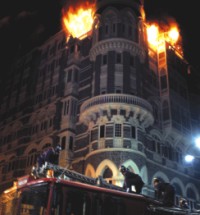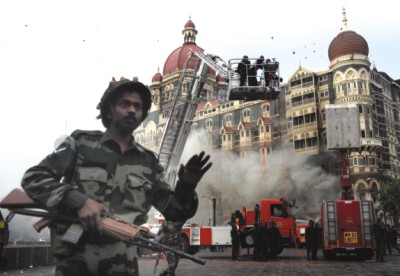|
Food for Thought
Sense and Sensitivities
Part I
Farah Ghuznavi
 The devastating terrorist strikes in Mumbai have left a bloody trail of death and destruction in their wake, echoing the aftermath of other such attacks in India. In recent times, the country has experienced a series of tragedies, including explosions in the political capital Delhi, the tourist centre of Jaipur, the technology heartland of Bangalore and the industrial hub of Ahmedabad, as well as the commercial capital of Mumbai. Not surprisingly, Indians are feeling anger, bewilderment and a sense of outrage at these events. Nevertheless, the overall response of the Indian people and their government has been, so far, commendably restrained. Foreign Minister Pranab Mukherjee has ruled out hasty action against Pakistan, but India has also warned its neighbour that it is not satisfied with actions taken thus far by the government across the border. The devastating terrorist strikes in Mumbai have left a bloody trail of death and destruction in their wake, echoing the aftermath of other such attacks in India. In recent times, the country has experienced a series of tragedies, including explosions in the political capital Delhi, the tourist centre of Jaipur, the technology heartland of Bangalore and the industrial hub of Ahmedabad, as well as the commercial capital of Mumbai. Not surprisingly, Indians are feeling anger, bewilderment and a sense of outrage at these events. Nevertheless, the overall response of the Indian people and their government has been, so far, commendably restrained. Foreign Minister Pranab Mukherjee has ruled out hasty action against Pakistan, but India has also warned its neighbour that it is not satisfied with actions taken thus far by the government across the border.
There have, however, been clear warning signs that the situation needs to be handled strategically in order to prevent chauvinistic elements within from hijacking the situation, at the expense of the nation as a whole. Media coverage of the crisis in Mumbai was extensive (many would say, too extensive), and while most of the reportage avoided an overtly jingoistic tone, some disturbing trends quickly became evident.
For one thing, it was hard to miss the disproportionate attention given by media organisations to the events taking place in the two luxury hotels, the Taj and the Oberoi. While the continuing siege undoubtedly meant that the hotels would have naturally received some degree of priority in terms of reporting (cynics have pointed out that the surge in ratings as a result of the 24-hour coverage was unprecedented), the extent to which the coverage was concentrated on those two locations struck a decidedly jarring note.
By contrast, while the siege of the Jewish Centre received some attention, the attacks on the Chhatrapati Shivaji railway terminal, the Cama hospital and the other sites were shamefully neglected, particularly given the high numbers of casualties in those locations. Indeed, when one South Indian print journalist complained about this to the various TV stations, the only person who even bothered to acknowledge his point was Srinivasan Jain from NDTV. Clearly, at least one thing that made the Mumbai attacks different from most previous terrorist strikes was that the ruling classes of India felt a chill go down their collective spine at the thought of how easily they themselves might have been one of the victims at the luxury hotels.
 The various talk shows that followed the attacks continued to focus on events at the hotels, confirming the bias of earlier media coverage. Anger at politicians was clearly evident, as was the desire for concrete follow-up action. But for a change, it was refreshing to see that many of the views expressed were both rational and constructive, despite the obvious hurt and anger that people felt. Unfortunately, there were also some notable exceptions to this pattern - including the renowned programme “We the People” hosted by Barkha Dutt, and featuring the fluffy film and TV personality Simi Garewal. The other panel members' substantive contributions were ultimately overshadowed by this one person. The various talk shows that followed the attacks continued to focus on events at the hotels, confirming the bias of earlier media coverage. Anger at politicians was clearly evident, as was the desire for concrete follow-up action. But for a change, it was refreshing to see that many of the views expressed were both rational and constructive, despite the obvious hurt and anger that people felt. Unfortunately, there were also some notable exceptions to this pattern - including the renowned programme “We the People” hosted by Barkha Dutt, and featuring the fluffy film and TV personality Simi Garewal. The other panel members' substantive contributions were ultimately overshadowed by this one person.
Previously known for her sickly sweet, nauseatingly coy interviews of celebrities on her talk show, on this occasion, Ms. Garewal's performance was nothing short of vitriolic. She held forth about how India should simply bomb all terrorist training grounds on Pakistan, including “suspected terrorist camps”, in order to send the message that this mighty nation was not to be trifled with. Going even further, she asserted that when one “looked down” at the slums (clearly indicating where her class loyalties lay), one could see flags flying. And what were those flags? According to her, not the Indian flag, not the Congress flag, but the Pakistani flag!
Quite apart from the absurdity of this assertion (the idea that anyone would be suicidal enough to fly Pakistani flags after an incident like this is patently ridiculous), to make such a statement is nothing short of an incitement to riot against minorities living within those slum populations. I was disappointed to note the failure of Barkha Dutt, a respected journalist and anchorperson, to rein in Garewal's wild assertions, or to encourage the others on this show, many of whom spoke well, to refute her views or express their own more robustly.
It was only when the reaction to Garewal's obnoxious commentary came in the form of an outburst from a young man in the audience, who accused people like her (and not Pakistan) of being the problem, that Barkha ponderously moved into action, rebuking them for letting themselves down, and requesting silence from everyone not very successfully, I might add. Furthermore, although the young man was quick to apologise for his language, no such gesture was made by the unrepentant Ms. Garewal.
Another somewhat worrying aspect of media coverage was the usual, almost automatic inclusion of Bangladesh's "suspected" involvement in the events in Mumbai, mentioned repeatedly in the immediate aftermath of the attacks. This is not the first time such accusations have been thrown about with an unacceptable degree of ease and without any sign of proof; the same thing has happened after almost every other recent attack. And the sad fact is it would not be impossible for this to indeed be the case. But it does not help bilateral relations or greater mutual understanding between India and Bangladesh to have such serious statements made with a degree of casualness that borders on insulting.
It was initially reported that the lone surviving gunman had stated under interrogation that 40 individuals were involved in the strikes, among which 29 were from Pakistan and 11 from Bangladesh. Whatever the truth of that piece of reportage the allegations were never repeated thereafter, with suspicion concentrated firmly on India's neighbour on its western border. But at the time, that "news" was broadcast repeatedly; and subsequently, the accusations against Bangladesh were never officially withdrawn or apologised for. I would respectfully submit that India should think twice about adopting such an attitude, not least because it runs the risk of becoming a self-fulfilling prophecy.
(to be continued next week…)
All facts and figures taken from The Independent (UK), The Telegraph (India) and NDTV
Copyright
(R) thedailystar.net 2008
|
|
